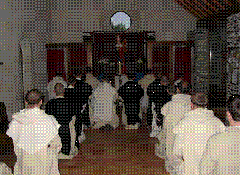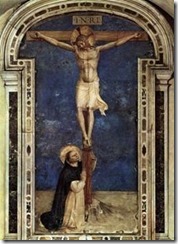Answer to Fr Bouchacourt (SSPX)
On July 1, 2015, on the Porte Latine, website of the Society in France, Fr Bouchacourt, Superior of the District, published a communiqué warning against the Dominican community of Avrillé. The same communiqué was also published in Fideliter 227, September/October 2015, magazine of the Society in France.
The Dominicans answered respectfully on their Website.
As the Society is now spreading the English translation of the communiqué of Fr Bouchacourt, the Dominicans publish here their answer in English.
Here in part 1 is the communiqué of Fr Bouchacourt, followed by the answer of the Dominicans:
PART 1. Communiqué of Fr Bouchacourt
1. For more than a year the Dominican Fathers of the friary in Avrillé have been spreading and supporting defiance against the authorities of the Society of St. Pius X, especially with regard to Bishop Fellay and the General House.
During conferences, in publications and on their website, they have accused the superiors of the Society of St. Pius X of giving up the good fight for the Faith in order to drag the Society at all costs into an agreement with the Roman authorities.
We have tried, in vain, during various meetings, to prove to them the contrary and to show them that their attitude was imperiling the unity of Tradition by sowing doubt and division. This communique intends to re-establish the truth so as to defend the honor of our superiors and that of our priestly family.
2. The outstanding acts of this increasingly public opposition were the following:
- On Sunday, January 19, 2014, the Dominican Fathers distribute to persons who came to attend Mass at the friary in Avrillé their “Address [Appeal] to the Faithfulâ€, a document made public on January 7 of that year, accusing the General House in Menzingen of going “in the opposite direction†from the one pursued until now by Archbishop Lefebvre, “by getting closer to modernist Rome†and stubbornly continuing “on that path that leads to deathâ€; the Fathers in Avrillé are among the signers of this document;
- On that same day, Fr. Pierre-Marie gives a conference to the faithful who came to Avrillé, to explain and justify the validity of this “Address to the Faithfulâ€;
- The text of this “Address to the Faithfulâ€, accompanied by an introduction justifying it, is published in the magazine Le Sel de la terre [The Salt of the Earth], no. 88 (Spring 2014), pp. 138-139;
- Confidential correspondence exchanged with Bishop Fellay after the publication of the “Address to the Faithful†is published in Le Sel de la terre, no. 89 (Summer 2014), pp. 215-220;
- The Dominican Fathers take a position in favor of the episcopal consecration of Bishop Faure on March 19, 2015, and publish a long dossier justifying this act in Le Sel de la terre, no. 92 (Spring 2015), pp. 139-169.
3. Like all the signers of the “Address to the Faithfulâ€, the Dominican Fathers of Avrillé thought that they had to present:
“…not a declaration that they were breaking away from the Society of St. Pius X, but on the contrary, public testimony to their firm, faithful attachment to the principles that always guided Archbishop Lefebvre in the fight for the Faith.”
But in this they are laboring entirely under a delusion and are drawing into it all who follow them. For Archbishop Lefebvre always conducted this fight for the Faith not only in doctrinal fidelity to Tradition, but also in order, in unity and in peace, in the spirit of obedience.
The Fathers of Avrillé are not faithful to these principles, for they denigrate the authority of Archbishop Lefebvre’s successor and cast suspicion on the acts of his government so as to create a dialectic between the members of the Society and their superiors, setting even the priests one against another. In order to detach oneself [lawfully] from an authority, it is necessary for the latter actually to urge the subjects to sin against faith or morals.
Now the Dominicans of Avrillé cannot show which acts performed by the Superior General demonstrate that “Menzingen is betraying the fight for the Faith.†Therefore the General House is not the one that is currently betraying this fight for the Faith; rather, those who label themselves the “Resistance†are the ones who are weakening it by their subversive manoeuvers.
4. The consecration of a bishop by Bishop Williamson is altogether unjustifiable. Whatever may be the false pretexts whereby some try to make it plausible, it only aggravates this spirit of independence and division. Archbishop Lefebvre always expressed himself very clearly to warn us against such a state of mind. As he said during a meeting held in Econe on July 4, 1988:
“The Superior General is the one who maintains the ties with Rome and, in a word, takes responsibility for Tradition, for this is the structure of the Society that exists in the Church’s eyes. We never wanted any organization of Tradition or any presidency of such an association; nonetheless the fact remains that the Society is de facto the spinal column of Tradition, its providential instrument, on which all initiatives of Tradition must rely.â€
In supporting the episcopal consecration of Bishop Faure, the Dominican Fathers of Avrillé make themselves accomplices in a harmful act and do serious damage to the common good of Tradition, inasmuch as the only reason mentioned to justify this act is based on the unproven accusation that the Society of St. Pius X had abandoned the fight for the Faith.
5. It is obvious that no superior who is responsible in God’s sight for the good of his district can fail to react to these repeated provocations [prises de position]. We cannot allow distrust, division, or a partisan, disparaging spirit to become established within our ranks. This is a matter of the common good of the flock, and the first duty of a pastor is to preserve its unity and cohesion by putting it out of the reach of these troublemakers.
6. Consequently, given so many dishonest accusations, the District of France can no longer support the Dominican community in Avrillé which, by its subversive schemes, is sowing doubt and division in the ranks of Tradition and weakening its forces.
This situation is very regrettable. May the Holy Ghost enlighten the superior of the Dominican community in Avrillé, and may Our Lord and Our Lady keep us in the unity of truth and charity, faithful to the good fight for the Faith conducted by Archbishop Lefebvre, for the honor of Christ the King, that of Holy Church and the good of our souls.
Fr. Christian Bouchacourt, SSPX District Superior of France
July 1, 2015, on the Feast of the Most Precious Blood of Our Lord
PART 2. Respectful answer of the Dominicans in six points
Point # 1. We read in the communiqué:
“During conferences, in publications and on their website, they [the Dominicans of Avrillé] have accused the superiors of the Society of St. Pius X of giving up the good fight for the Faith in order to drag the Society at all costs into an agreement with the Roman authorities.â€
This is inexact.
Our disagreement with the Superior General of the SSPX arises from the fact that the superior is prepared to make a practical agreement with authorities who still profess the conciliar errors.
* From 1988 to 2012 the Society held this wise principle:
â€No practical agreement with Rome without a prior doctrinal agreement.â€
This principle was again clearly affirmed by the Chapter of 2006:
“The contacts that the Society has from time to time with the Roman authorities has as its only goal to help them once again to take ownership of Tradition, which the Church cannot deny without losing its identity, and not the search for an advantage for itself, or to reach an impossible purely practical agreementâ€.
* In March 2012 Mgr. Fellay announced that he was abandoning this principle ( by affirming: “ it is not a question of a principle but of a line of conductâ€). This abandonment was supported by the Chapter of 2012. Since then, despite numerous entreaties, Mgr. Fellay has refused to return to the former principle.
* On the 31st of May 2012, we wrote to Father Bouchacourt: “It is because we wish to keep this principle – which is the legacy of Mgr. Lefebvre – that you are preparing to condemn us. Or rather that Mgr. Fellay is preparing to condemn us by your mouthâ€.
Point # 2. We read in the communiqué:
‘The Dominicans of Avrillé cannot show which acts performed by the Superior General demonstrate that “Menzingen is betraying the fight for the Faith.†’
The words in inverted double commas are wrongly attributed to us: we are not the authors ( see Le Sel de la terre 92, p.141).
What we do say (and it is obvious from point 1), is that Menzingen has changed its line of conduct in its relationship with Rome, engendering a loss of confidence amongst a great number of traditionalists.
Point # 3. The communiqué reproaches us for having published “ a confidential correspondence exchanged with Mgr. Fellay†in Le Sel de la terre 89, p.215-22.
It is sufficient to refer to the published text to see that there is nothing confidential in these letters. Mgr. Fellay forbade us all collaboration with the Society, deprived us of ordinations and of the holy oils. It was normal that we should make known the reasons on which he purported to lean, and also that the rupture came from his side and not ours.
Point # 4. We read in the communiqué:
“The only reason mentioned to justify this act [the episcopal consecration of Mgr Faure] is based on the unproven accusation that the Society of St. Pius X had abandoned the fight for the Faith.â€
This is inexact.
We have expounded several grave objective reasons which justify the episcopal consecration of Mgr. Faure ( see Le Sel de la terre no. 92, p.139-170, and no. 93, p.200-208) and notably the fact that Mgr. Fellay refuses ordinations and even the holy oils (necessary for several sacraments, in particular extreme unction) to our community and to several others who do not share the new policy established in 2012.
Point # 5. The communiqué relies on words said by Mgr. Lefebvre during a meeting in Écône on the 4th of July 1988:
“We never wanted any organization of Tradition or any presidency of such an association; nonetheless the fact remains that the Society is de facto the spinal column of Tradition, its providential instrument, on which all initiatives of Tradition must rely.â€
As Mgr. Lefebvre said, it was a matter of fact (de facto) and not of right. This fact could have endured for a long time, if Mgr. Fellay had not taken the decision to break the unity of Tradition by changing the line of conduct with regards to Rome, and by excluding Mgr. Williamson from the Chapter of 2012, then by expelling him from the Society because he did not approve this change in the line of conduct.
Point # 6. We read again:
“This communique intends to re-establish the truth.â€
At the same time it accuses us of:
— spreading and supporting defiance against the authorities of the Society of St. Pius X;
— denigrating the authority of Archbishop Lefebvre’s successor;
— creating a dialectic between the members of the Society and their superiors;
— subversive manoeuvers;
— making themselves accomplices in a harmful act [the consecration of Bp. Faure];
— doing serious damage to the common good of Tradition;
— repeated provocations;
— [setting up] distrust, division, or a partisan, disparaging spirit;
— dishonest accusations;
— sowing doubt and division in the ranks of Tradition and weakening its forces;
— subversive schemes.
Is that all ? ….
The truth is something which accords with reality.
Also before “so many false accusations†we are happy to say to the readers of the communiqué: “Come and seeâ€, read our publications (Le Sel de la terre, our Letter to friends and benefactors, our English website), and see if what can be found there is compatible with the melodramatic description of the communiqué.
The reality is that despite the differences with the Superior General about his new policy towards Rome, on our part we remain friends of the Society, and we wish it to overcome the crisis which it has been undergoing since 2012.






